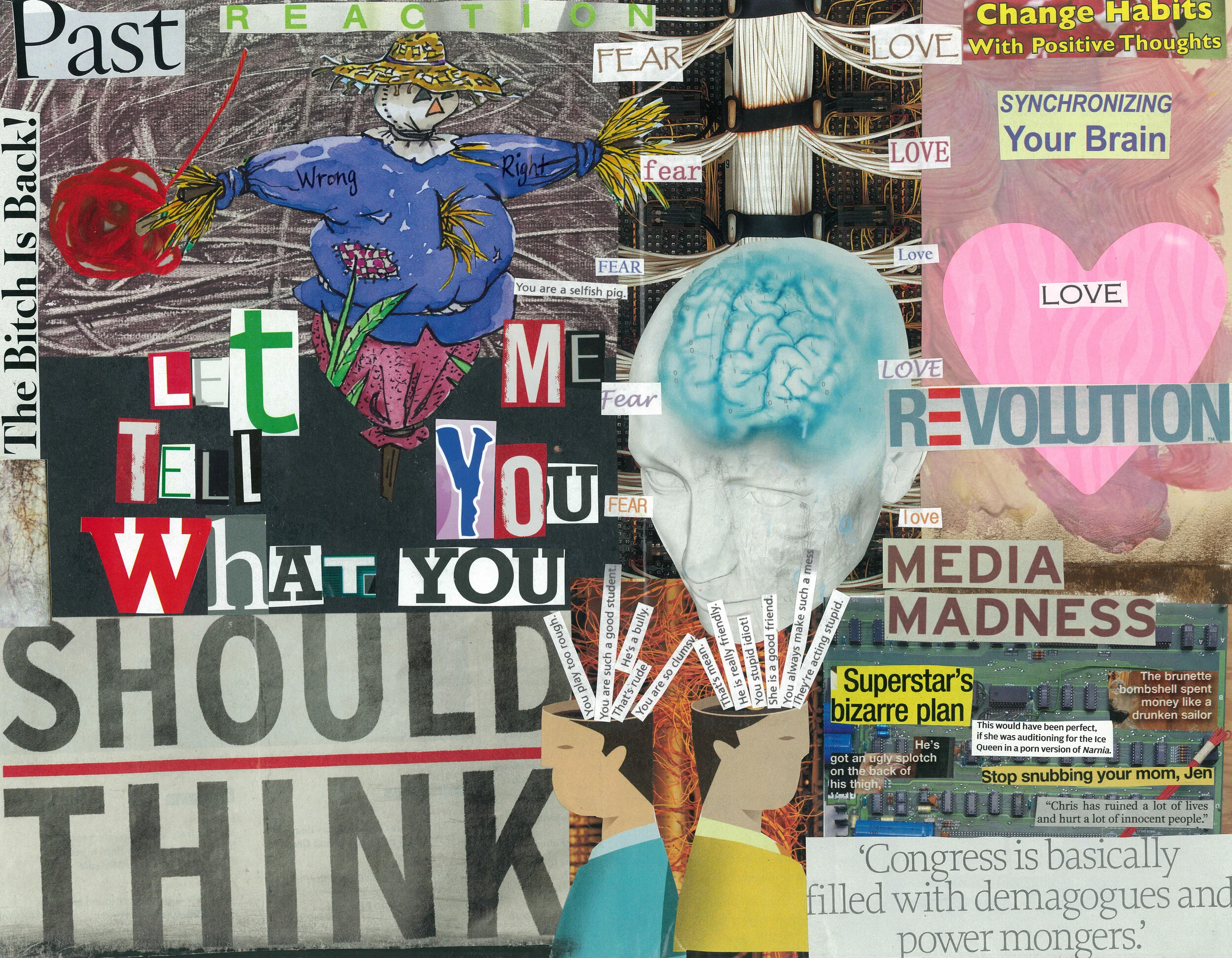THE EVALUATOR…YOUR BRAIN ON FEAR
Our culture of countless conflicts has been created over many, many years. I am not out to point fingers at any culprits, I know from the past that doesn’t allow for understanding and it hinders harmony between the pointed and myself. Given that our brains are impressionable and have undergone cultural programming that heightens fear and encourages evaluations, I think we have all contributed to its current state. I hope to highlight, as gently as I can, what I see that is blocking us all from experiencing peace within ourselves and in our global community.
We have been taught to react and re-evaluate.
We CAN rewire our responses by rebooting our compassionate core.
What I see is a world divided by 7.7 billion opinions about what is right and wrong, good or bad, things you should do, things you should not do, and where we end up as either winners or losers. I don’t think it is realistic, possible, or even desirable, for us all to agree on everything. I certainly do not foresee us all converting to the same spiritual or religious path, and I don’t believe any organized group has all the answers So where can a common ground be found?
“Right and Wrong” Maria Yunker
Purchased from JumpStory
We as humans are three-dimensional, diverse, and distinct. Our lives lived out in the world are also multi-dimensional, too interestingly complex to simplify and condense into good/bad, right/wrong, and best/worst. Unfortunately, we try to make life black and white, leaving little room to consider our countless colors, acknowledge our vibrant variety, have compassion for our circumstances, or for taking the time to perceive and ponder our many perspectives.
Dr. Marshall Rosenberg, the founder of NVC, has investigated how this great division among us has contributed to communication that he calls “life alienating”, where we continuously create more divisions between us, amplifying our disconnection. One kind of alienating communication is the use of “moralistic judgments that imply wrongness or badness on the part of the people who don’t act in harmony with our values.”
Purchased from Jump Story
Another kind of judgment is actually an acknowledgment of what we value in life, a value judgment. There is a difference. Marshall describes it this way: “Value judgments reflect our beliefs of how life can best be served. We make moralistic judgments of people and behaviors that fail to support our value judgments.”
Because of our fear programming, we believe we are meant to evaluate all incoming data; everything we encounter in life from sensory information, media, and of course each others’ behavior and appearance. Ideally, we could be as blissfully unbiased as a baby and just observe instead of evaluate, without even a desire to make a decision about what we think or feel. Instead, we use our values as a guide while we assess this data to see if it complies with those values. And as we have been demonstrated to us by the adults we watched as children and the stories and shows we grew up on, we make moralistic judgments about the non-complying data with judgments, comparisons, diagnoses, blaming, and insults. Heartbreakingly our collective evaluation is perpetuating poking and pain for everyone. Sometimes the pokes are more of a defense or counterattack: a beat out with blame. “It’s not my fault we were late. You are the one who forgot the directions.” “Your problem is that you are too lazy, that’s why you won’t amount to anything” “They’re all out of their minds.” We also self-deprecate: beat in with shame. “I’m a f^@%ing moron, I can’t do anything” “I’m ugly, I’m fat, I’m stupid, I’m crazy, I suck, everyone hates me.” Ouch!
Nathan Shively shivelycreative, CC0, via Wikimedia Commons
Someone may say “littering is so wrong and “people who litter aw A**holes” who don’t give a sh!t about anyone but themselves.” Had we been shown how to operate on a conscious program of consideration and compassion, we would have been taught how to articulate ourselves and share how we feel and what we value without implying wrongness when we are triggered by unmet values. Then we may hear more of this, “I feel so disheartened when I see so much trash on the side of the road, I so wish to live in a world that honors the beauty of our shared home.” That’s a version you can choose. There are limitless ways to infuse our personality with colloquial language and our inherent compassion. “Dude! why we gotta be sh!ting on the beauty we have left in this mad world!” Unfortunately, we are like slaves to our programming where someone or something has to be blamed or labeled wrong. We are constantly asking ourselves, “How shall I direct my evaluation?”
Here are some more ways we as fabulously flawed, imperfectly perfect, evolving humans are dividing ourselves.
Denial of Responsibility
We have phrases built into our language that blur our acknowledgment that we are all responsible for how we think, feel, and act. We want to put the blame on outside forces and imply we had no choice. “I started drinking because all my friends did.” “I didn’t want to hit my child but I had to because they hit another child.” “I’d rather stay home but I have to go to the party or my friends will be mad.” It takes a lot of vulnerability and courage to own that you are choosing to go to the party because you want acceptance and harmony with your friends. We are also just confused by where our feelings originate and often credit or blame others for them. “You make me feel inspired”, or “It’s all your fault I'm pissed off.” And when we see someone close in pain, we often take the blame, “It’s my fault you are feeling this way. I should have been able to make you happy.”
Your feelings are born inside you. It is impossible for another to control your emotional state
It can be liberating to own your thoughts, feelings, and actions
You are not an emotional slave. You are not responsible for the feelings of others.
Photographer: Jason Clendenen, Public Domain, via Wikimedia Commons
Demands Um, I don’t think anyone on Earth enjoys being told what to do, especially when it is expressed by way of a demand that is either subtly or not so subtly threatening. You know it’s a demand if, when it is not complied with, there will be some kind of punishment, and is very common, especially among those with authority. It’s like we have collective denial that it is impossible to make anyone do anything, our only power is the threat of punishment. In this post, A Key Model of NVC I describe the entire NVC process and an alternative to demands…requests that inspire intrinsically motivated behavior that understands why you want what you want.
Life-alienating communication encourages us to see our actions as either deserving reward or punishment. “That litterer deserves a fine and community service, picking up trash with his bare hands.” Dr. Rosenberg states it this way, “It assumes ‘badness’ on the part of people who behave in certain ways, and calls for punishment to make them repent and change their behavior." I agree with Marshall. Change that is real, lasting, and meaningful is a change that you choose, because it is an expression of who you want to be, and you believe it will benefit you. We have the potential to push ourselves beyond outdated ways of thinking from our past and recreate a revitalized reawakened way of looking at ourselves and the World.
Our misses of Communication:
defensive diagnosis demeaning deprecation
denial, demands, and deciding deserved-ness,
are such a dis to connection
creating distortion
*All quotes are from Nonviolent communication A language for life by Marshall Rosenberg.
Rosenberg, Marshall. The Nonviolent Communication Training Course: Sounds True, 2006. Print.





